By Greg Hernandez
It was the day before Thanksgiving last year, and Joann Cerda wasn’t expecting many folks to turn out for the monthly Familia Afortunadas meeting she moderates at the Los Angeles Center’s Mi Centro location in Boyle Heights.
“It was pouring rain outside, and I thought we might have maybe 10 people,” Cerda recalls. “Instead, we had 45 people show up. It ended up being this dynamic pre-Thanksgiving gathering with rotisserie chickens and side dishes. Everyone was choosing to be here. It was unbelievable—and magical.”
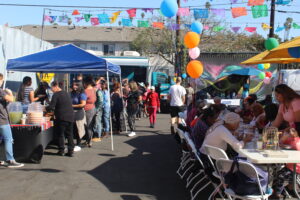 That magic began five years ago this month when the Center partnered with Latino Equality Alliance (LEA) to open Mi Centro in order to better serve the community of LGBTQ people living on the eastside of Los Angeles.
That magic began five years ago this month when the Center partnered with Latino Equality Alliance (LEA) to open Mi Centro in order to better serve the community of LGBTQ people living on the eastside of Los Angeles.
Forging the partnership with LEA “has been a really important part of what we’re doing. It allows us to expand our reach and it allows them to be a part of a larger organization,” says Alan Acosta, the Center’s director of strategic initiatives.
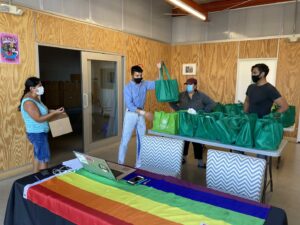 Mi Centro is housed within City Labs Boyle Heights, a locally owned, purpose-driven collaborative space for innovators, entrepreneurs, and creatives. Located at 553 S. Clarence St., between the 4th and 6th Street bridges, Mi Centro has become a space for community gatherings, meetings, services, programs, and counseling and, since the COVID-19 pandemic began, a Pride Pantry where residents can pick up fresh produce and dry goods every Friday for free.
Mi Centro is housed within City Labs Boyle Heights, a locally owned, purpose-driven collaborative space for innovators, entrepreneurs, and creatives. Located at 553 S. Clarence St., between the 4th and 6th Street bridges, Mi Centro has become a space for community gatherings, meetings, services, programs, and counseling and, since the COVID-19 pandemic began, a Pride Pantry where residents can pick up fresh produce and dry goods every Friday for free.
“Mi Centro is one of the Center’s community hubs that is focused on what people who live in the Boyle Heights area need the most,” explains Center CEO Lorri L. Jean. “One of the things that I really love about it: it’s not just LGBTQ people. It’s also our families who are participating in the programs and services. At first a lot of neighbors were skeptical about what we were going to bring to the community and now they’re on board.”
Caín Andrade (pictured with Cerda in top photo), the Center’s social networking groups coordinator, says it’s been imperative for Latino families to know Mi Centro is a safe, brave space for our communities.
“When you come out in that community, it has to do more with the entire family. It includes the aunts, the uncles, the grandmas, the grandpas,” Andrade says. “Everyone’s involved, and everybody comes to meetings because they want to learn, they want to evolve. Mi Centro is really the only place they can get these kinds of resources and support in Spanish.”
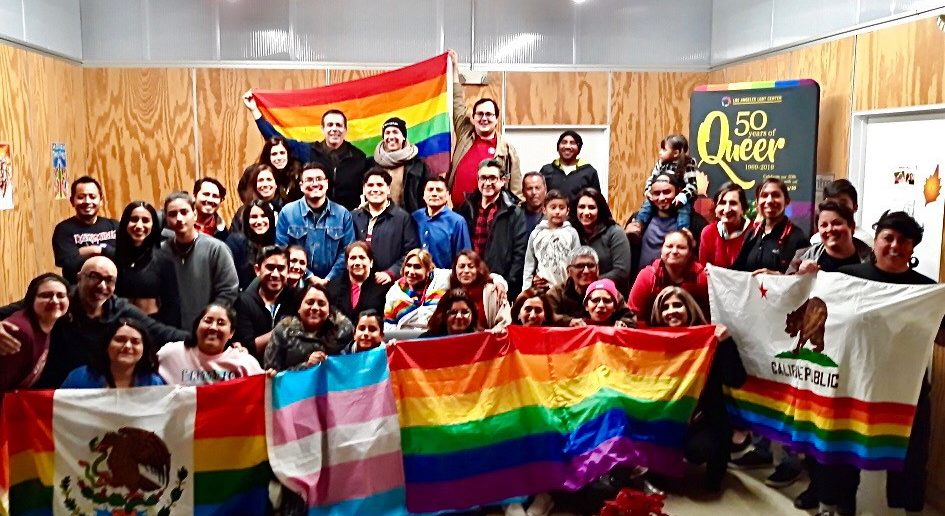
“You Feel Like It’s Your Family”
Among those who have found strong connections at Mi Centro is Sergio Aguilar, the father of a pansexual daughter who encouraged him to start attending the Wednesday night Families Afortunadas meetings after she came out to the family more than three years ago.
“I felt very comfortable even when I first came in. Everybody was friendly,” he shares. “One of the reasons I like the idea of attending a meeting with Spanish-speaking people: it’s not only the language but the culture. I feel understood.”
Aguilar is among the meeting’s regulars who volunteer to share their stories with new visitors to help them feel safe and supported.
“They start to feel comfortable, and sometimes they start crying,” says Aguilar who gets choked up himself talking about the process. “Sometimes it’s very emotional. Sometimes we identify with what they are talking about and it brings up feelings. We cry with them. You feel like it’s your family.”
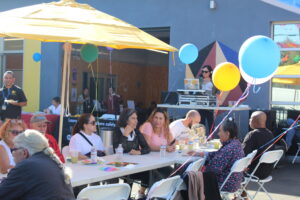 This kind of connection and camaraderie is beyond what Cerda, the Center’s youth & family connections manager, could have dreamed of when she became involved with the programming at Mi Centro more than four years ago.
This kind of connection and camaraderie is beyond what Cerda, the Center’s youth & family connections manager, could have dreamed of when she became involved with the programming at Mi Centro more than four years ago.
“Members of the community have a newfound family within the space and realize, ‘I’m not the only family in Boyle Heights who is actually experiencing this,’” she says. “You come into a space where, at first, you feel isolated, you feel alone. You come in, and it’s like having a family conversation around the dinner table. You build family, you build community, and then folks keep coming back.”
The conversations during the Familia Afortunadas meetings can be tremendously difficult because many of the attendees are Catholic and are seeking a way to reconcile their religion with loving their LGBTQ children.
“It’s very powerful because it absolutely 100 percent intersects,” Cerda points out. “This is the space where they are able to share ideas, to share thoughts. You have permission to walk into that door and say all the wrong things. Later, you get to the point where you say, ‘I can’t believe I said A, B and C.’”
The Familia Afortunadas meetings started as a space for conversation when Cerda brought two licensed therapists into the support group. The evenings have branched out into people coming into the space who need individual or family therapy.
“The therapy is for the LGBTQ person and/or the family,” Cerda says. “Many times they both need it just as much.”
The COVID-19 Challenge
Services at Mi Centro include immigration and housing support, legal services, transgender support services, youth and senior programming, and family counseling and empowerment programs.
When the COVID-19 pandemic hit last March, it slowed some of Mi Centro’s hard-earned momentum. Nowadays, support groups and workshops are being presented online via virtual platforms.
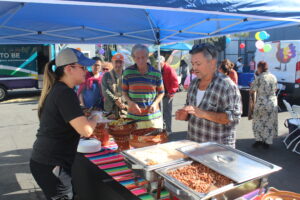 “The Latinx community depends so much on convivencia (coexistence) where everyone is gathered around your kitchen table together. That’s what we recreated at Mi Centro,” Andrade explains. “We have done our best to try and duplicate that essence virtually, but it’s hard. Our families are not adjusting to the virtual format as much as we want them to, and we understand why. They need to talk to you face-to-face, they need to give you a hug, they need to embrace their community.”
“The Latinx community depends so much on convivencia (coexistence) where everyone is gathered around your kitchen table together. That’s what we recreated at Mi Centro,” Andrade explains. “We have done our best to try and duplicate that essence virtually, but it’s hard. Our families are not adjusting to the virtual format as much as we want them to, and we understand why. They need to talk to you face-to-face, they need to give you a hug, they need to embrace their community.”
Despite the current challenges, groups have continued to meet consistently during the pandemic and community members are also able to connect at the Pride Pantry on Fridays from 1-5 p.m.
“We’ve had folks coming to Mi Centro for the first time because of the pantry. Once we give them the food, you see the smiles. To provide a smile to a family during the pandemic means so much to them and also to the staff of Mi Centro,” says LEA Executive Director Eddie Martinez. “We use this opportunity to not only provide food but to also provide resource information about legal help or assistance with rent. They’re struggling, they’re worried.“
The pantry was also an ideal place to inform people about the U.S. Census and emphasize how important it was to be counted so that local communities can get their fair share of governmental resources and representation.
Community organizer Norma Sanchez says that, despite the pandemic, she is proud Mi Centro continues to be “like the hub of anything LGBTQ and Latino” in the neighborhood.
“People just come and visit, especially now with Pride Pantry,” she says. “We do a lot of outreach in schools. I provide parent workshops weekly. You’re teaching them, and they are teaching you. You become bonded like chosen family.”
The Future of Mi Centro
Mi Centro, along with the Center’s Trans Wellness Center in Koreatown and Center South in South Los Angeles, recently achieved Federally Qualified Health Center status, which means health care services can be expanded at those locations.
Due to COVID-19, the current plan is to expand health services, including primary care and mental health, at Mi Centro in April 2021.
In the meantime, free HIV testing has been expanded and is nowavailable every Wednesday and Thursday from 10 a.m.–7 p.m. Drop-ins are allowed, but an appointment is highly recommended by calling the Center’s Health Services department at 323-993-7500.
“This helps us to have a more prominent programming around sexual health and HIV testing,” says Jeffrey Rodriguez, the Center’s associate director of community health services. “Mi Centro has become a safe place for our LGBTQ community in Boyle Heights. We are providing a safe place for people to have a conversation about their sexual health in a non-judgmental manner.”
For more information about the Center’s services and locations, go to lalgbtcenter.org


